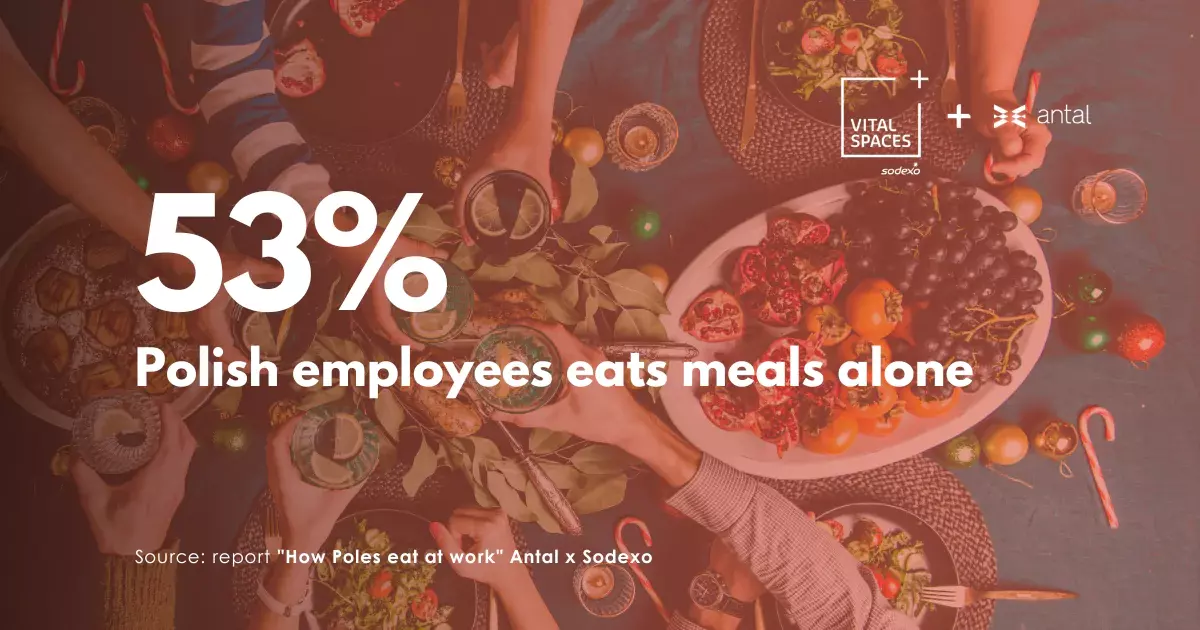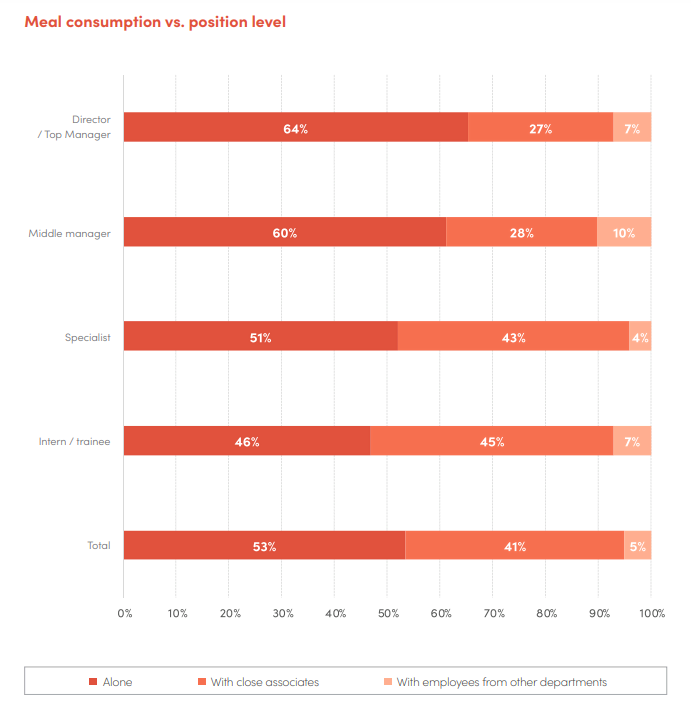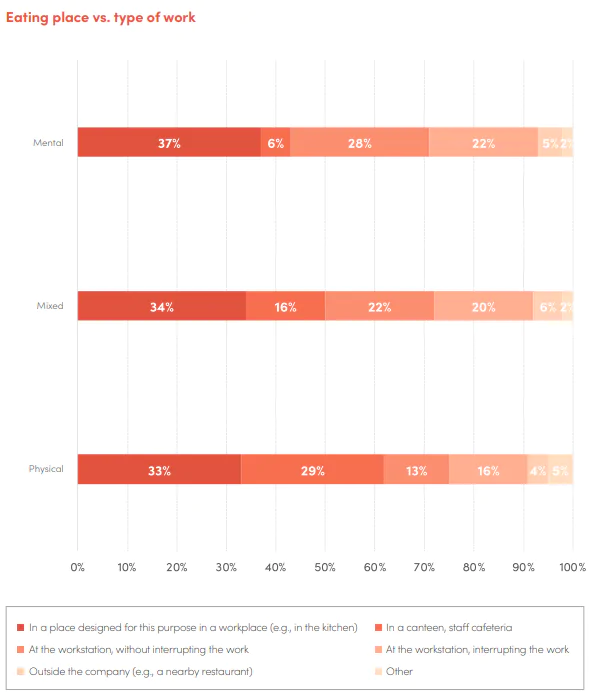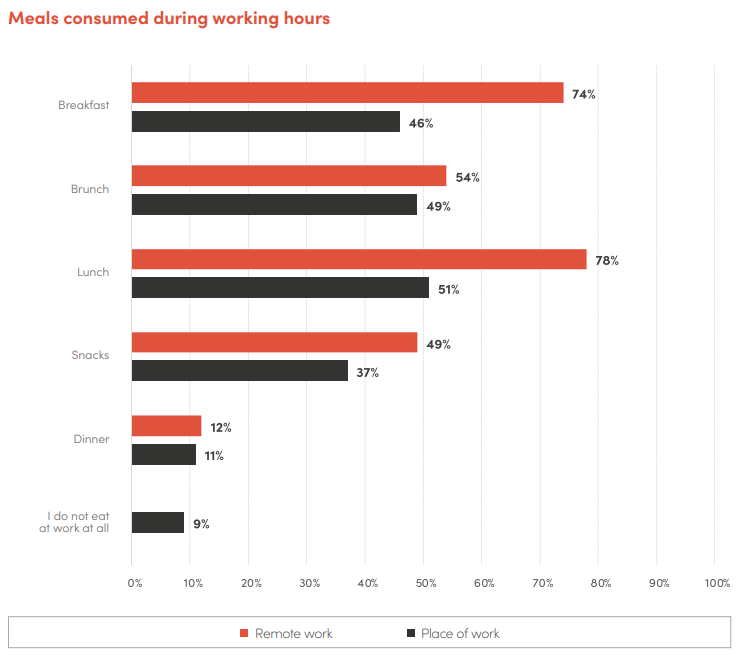1 out of 10 employees doesn't eat a single meal at work. A new study by Antal and Sodexo.

Table of contents
Poles eat in solitude - how to change this?

The choice to eat alone can be driven by various factors, and in many cases, it might be a result of the workplace atmosphere. If there are no good relationships within the team, employees often choose to spend their lunch break alone instead of with their colleagues. In such a situation, it might be worth considering organizing a joint breakfast or lunch for the team, recognizing the integrative potential of such an activity. In the summer season, a group meal can take the form of a barbecue, which also provides a less formal, picnic-like atmosphere - says Marcin Grabiwoda, Food Transformation Director.
Vegan diet a hit not only among the young
At work, about half of the respondents eat breakfast, a second breakfast, and lunch. At the same time, it's worth noting that every tenth respondent doesn't eat a single meal at their workplace. This situation most often concerns directors and interns. Almost 40% of those surveyed also reach for snacks at work. Managers and directors do this more frequently compared to those in lower positions.

The data presents an interesting picture of the dietary habits of Poles at the workplace. There's a clear distinction between white-collar and blue-collar workers when it comes to consuming lunch – the former more often eat their main meal at work. At the same time, although most employees don't follow strict diets, there's a growing awareness of nutrition, emphasizing healthy eating and monitoring nutritional components. Vegetarian and vegan trends seem to be popular among younger people and those above the age of 43, which indicates a diverse approach to diet depending on age – comments Katarzyna Sławińska, Team Manager at Antal, Engineering & Operations.
Office vs home: where do we eat better?
Employees eat more meals when working remotely than at the workplace. This is especially true for meals like breakfast and lunch. Interestingly, none of the respondents said that while working remotely they missed having even a single meal – in contrast to the 9% in the office.

Remote work has clearly impacted the dietary habits of many, focusing them on regular and wholesome meals, in contrast to the quick solutions typical of the office environment. The ability to use one's own kitchen facilitates the preparation of healthy dishes and adapting the diet to individual needs. On the other hand, the lack of appropriate amenities in offices often leads to choosing less healthy snacks or ordering meals for delivery. These trends emphasize the importance of adapting workplaces to the needs of employees in terms of healthy eating - comments Aleksandra Jędrzejczyk, Team Leader at Antal, SSC/BPO.
Eating at work - law
In Poland, issues related to eating and meal breaks at work are regulated by the Labor Code and other legal acts.
- Meal breaks: If the daily working time exceeds 6 hours, the employee is entitled to a break for rest and a meal. The length of this break depends on the characteristics of the work and arrangements with the employer, but it cannot be shorter than 15 minutes.
- Uninterrupted work: When working in an uninterrupted system (e.g. working on a production line), the employee must be provided with the opportunity to eat meals while working.
- Payment for the break time: Normally, a break for rest and a meal is not included in the working time and the employee is not entitled to remuneration for it, unless it results from individual or collective arrangements with the employer.
- Meal premises: The employer is obliged to provide employees with a place where they can eat their meals. Depending on the type and size of the workplace, it can be, for example, a designated room or zone inside the building. In larger workplaces there may be special canteens.
- Night meal break: Employees who work at night, if their daily working time exceeds 6 hours, are entitled to a 20-minute paid break included in the working time.
- Specificity of certain industries: In some sectors, such as transport, there are additional regulations regarding breaks and eating, resulting from the characteristics of the work.
About the study
The Antal and Sodexo study “How Poles eat at work” was conducted using the CAWI method on a sample of 1,044 respondents between June 27 and July 7, 2023.
Download report: https://en.antal.pl/insights/report/how-do-poles-eat-at-work














